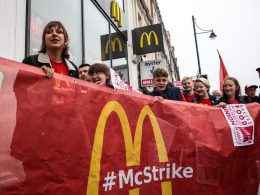By Fiona O’Loughlin
REFLECTING THE scale of the economic crisis the government is to introduce a second budget that will contain €4.5 billion of new taxes and spending cuts. The latest exchequer figures show a potential tax shortfall of a further €3 billion and a shortfall in funding for government departments of up to €1.5 billion. If anything these projections will be an underestimation of the decline in the governments finances.

The opposition parties, the trade unions and IBEC, have all been briefed on the situation. Minister for Finance Brian Lenihan invited the opposition parties, IBEC and the trade union leaders to briefings on the crisis in an attempt to “get a national consensus on what needed to be done”.
One consensus that is emerging amongst the right-wing parties is that the low paid will have to take their “share of the burden”, and that income tax should be imposed on their meagre wages. Brian Lenihan said that “everybody will have to pay something”. Of course all workers, including the low paid already pay a large percentage of their income on tax through various stealth taxes, bin charges, VAT and the 1% levy imposed at the last budget. New taxes on these workers will push many that are already classed as the working poor even further into poverty.
The new budget will see the government increasing taxes on the public sector workers who have just been hit for the pension levy. The combination of the levy pay cut and tax hikes will leave tens of thousands of public sector workers struggling.
Mary Hanafin, Minister for Social and Family Affairs, who said the government was aiming to protect the “most vulnerable” also pointed out that her department’s budget was approaching €20 billion at a time when income tax would raise only €35 billion. Brian Lenihan commented that the cost of living was falling and that social welfare benefits needed to reflect the cost of living. This would indicate that the government is planning to cut social welfare benefits. Initially this might start with the taxing of child benefit, but with unemployment heading towards 500,000 it is only a matter of time before they cut dole payments and other benefits.
As well as tax increases there will be further cuts in public spending that will have a major impact on already severely under funded public services.
The scale and speed of this crisis is unprecedented, in the first two months of this year there was a 24% fall in revenue and an historic rise in unemployment. This has hit working class families hard.
Unfortunately this government are intent on increasing the burden of the crisis on the backs of the working class whilst their rich associates get off virtually scot-free.









